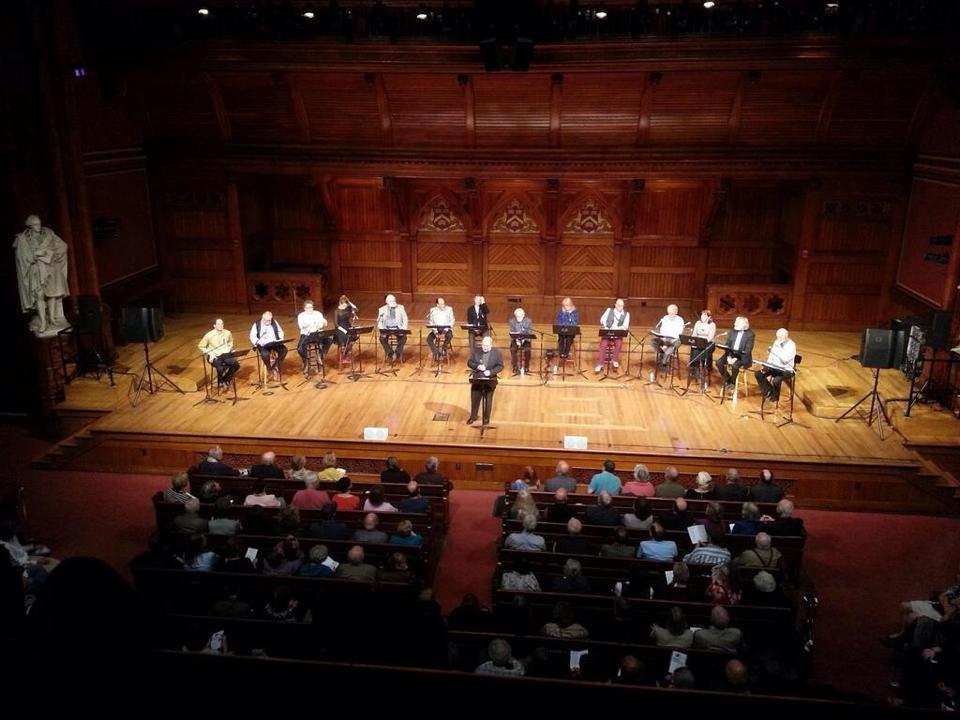
Photo courtesy of Artsboston; photo was grabbed from the Poet’s Theatre FB page. A picture of the cast at the reading with Mr. Scanlan in the front.
A celebration in honor of the revival of The Poet’s Theatre and the centennial of the Author’s birth.
Presented by The Poet’s Theatre
By Dylan Thomas
Directed by Bob Scanlan
Sanders Theatre, Memorial Hall
Harvard University
Sunday, Sept. 14, 2014 @ 7pm ONLY
Poet’s Theatre on Facebook
Review by Kitty Drexel
“…the idea that I write a piece, a play, an impression for voices, an entertainment out of the town I live in, and to write it simply and warmly and comically, with lots of movement and varieties of moods, so that, at many levels, through sight and speech, description and dialogue, evocation and parody, you come to know the town as an inhabitant of it.”
– Dylan Thomas – Collected Letters edited by Paul Ferris (London: Dent, 2000 (new edition)
(Cambridge, MA) Under Milk Wood is a radio drama by Welsh poet Dylan Thomas. It was performed on the stage during Thomas’ lifetime (and by Thomas himself). It became a movie directed by Andrew Sinclair, and featured Richard Burton, Elizabeth Taylor and Peter O’Toole, in 1972. For his centennial, the BBC has a site devoted to a recent film production of Under Milk Wood. All of this is mentioned because not nearly enough Americans have an appreciation for Thomas’ work – aside from his famous poem, “Do not go gentle into that good night.” His work is elegant, romantic, and, best yet, free to read on the internet or in a library. It is a worthwhile, mind-expanding endeavor to read as much of his collected works. If not for your own sake, then to woo a paramour or two.
This unexpectedly funny drama focuses on the inhabitants of the fishing village Llaregubb (read it backwards). It begins early in the morning while the good townsfolk are still dreaming. We follow them through a full day in their lives and leave them when they fall back to sleep that night. The audience learns about their secret fears, unrequited loves, gossip, and requited sex lives. We hear many a thought that the thinker would prefer unheard and see actions that can’t be unseen. It is all narrated by several neutral, bodiless voices.
To celebrate the return of The Poet’s Theatre to Cambridge, a cadre of Boston’s best theatre talent gave Sanders Theatre an electric performance. Thomas’ work has a natural rhythm that was nurtured by the cast. The language of Under Milk Wood is picture-rich. Great emphasis was put on the consonants of words in Thomas’ writing to create a pleasant sound to the ear. Frequently, lines ebbed and flowed into the audience like the waves on the shore of Aberystwyth* on a summer evening. It was quite enjoyable once the cast stopped competing for early laughs.
It makes perfect sense that radio would be the original genre for this production as its engineered sound would remove extra sibilants from speech and filter out naturally occurring white noises. The syntax of Thomas’ writing, like Shakespeare’s, requires some acclimation.The bathroom-like resonance of Memorial Hall combined with the fluid lines of Thomas’ poetry made focusing on the actors’ voices difficult. Even their modified pace wasn’t enough to counteract the bounce of words against wood paneling. Rest assured, the tech crew did an excellent job. Yet, this production would be better appreciated in a more intimate venue. Those who missed out due to sound issues can read Thomas’ work here.
Under Milk Wood has the spiritual simplicity of Our Town if it were packaged into a Terry Pratchett or Angela Carter novel. This performance was perfect to welcome back The Poet’s Theatre to Cambridge and to celebrate the work of Dylan Thomas. If this reading is any indication, The Poet’s Theatre is a necessary addition to the wealth of art in Massachusetts.
A quick note: The entire cast was White. There were 14 roles total; 10 men and 4 women. The BBC made this production available to actors of color. It would be a nice change if all area productions did as well.
*Aberystwyth is in western Wales.
